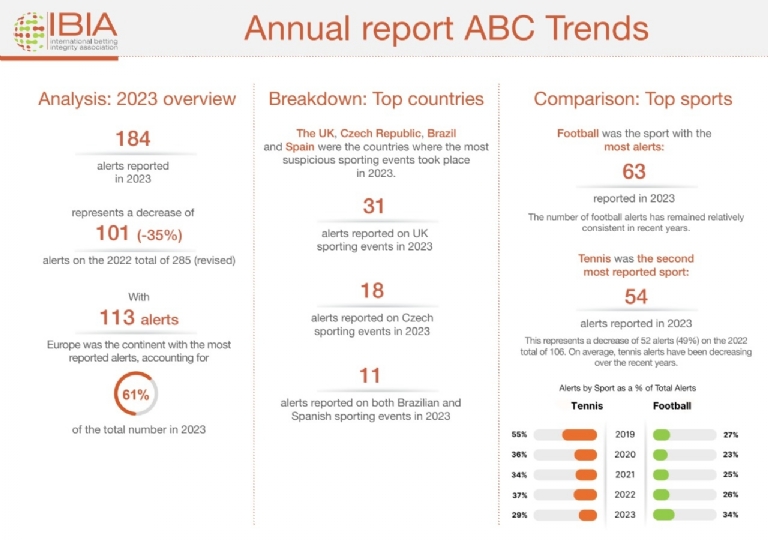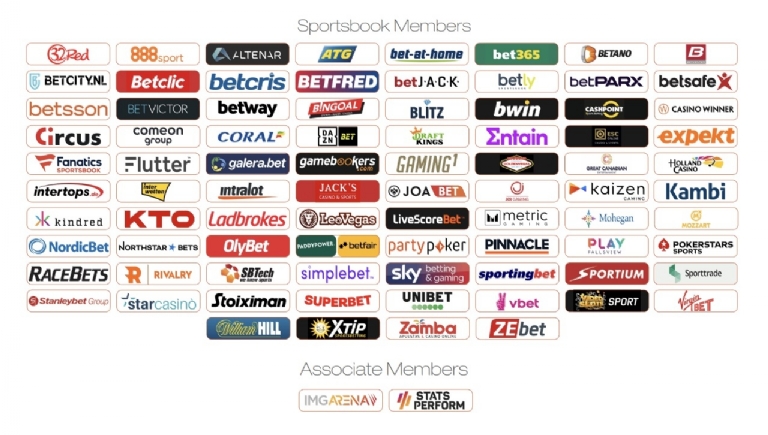

The report highlights that the total number of suspicious sports betting alerts reported in 2023 fell to 184, which represents a decrease of 101, or 35%, on the revised 2022 figure of 285 alerts. The global alerts for 2023 are significantly below the average of 244 annual alerts for the period 2019–2022.
The report also highlights that IBIA’s suspicious betting activity data helped to prove that 74 matches were corrupted and found that there was an increase in the number of clubs, players and officials successfully sanctioned for violating sports betting rules.
When considering the number of alerts reported, it is important to recognise that IBIA’s ability to detect and deter suspicious betting activity has increased significantly in recent years: it now accounts for over US$137bn of global betting turnover per annum, making IBIA the world’s leading operator-run integrity monitoring body.
These results confirm the importance of the legal requirement for regulated sports betting operators to join an international sports integrity monitoring body, increasingly imposed in well-regulated markets. That requirement was recently introduced in Brazil, which the 2023 report shows had the third highest number of suspicious betting alerts (11), behind the UK and Czech Republic.

Khalid Ali, CEO of IBIA, said: “The fall in last year’s global alert numbers is encouraging. It confirms that our world leading monitoring and alert network is making a very important contribution to deterring criminals from seeking to defraud our members, and that increased collaboration between IBIA, sports and regulators is a winning combination. Despite this progress, we must remain vigilant and recognize that the greatest threat to sports integrity comes from unregulated operators, most notably in Asia.”
IBIA uses suspicious betting activity data from its unique global monitoring network to help sports, regulators, policymakers and law enforcement to investigate and prosecute criminals. In 2023, IBIA alerts contributed to the investigations and subsequent successful sanctioning of 21 clubs, players and officials, an increase on the 15 sanctioned in 2022. Of the 21 sanctioned in 2023, there were 8 tennis players, 7 umpires and 4 snooker players.
In several of the cases, data from IBIA and its members helped contribute to significant sanctions, such as life bans, being issued. This collective action attests to the powerful impact of IBIA’s data and cross-sector partnership working.
In terms of individual sports, football was the sport with the majority of alerts with 63, with the number remaining relatively consistent over time, with 67 and 66 alerts reported in 2022 and 2021 respectively.
Tennis was the second most reported sport, with 54 alerts. This represents a 49% decrease on the 2022 total of 106. On average, tennis alerts have been decreasing over the past years, and for the first time the number of tennis alerts is below football.

Khalid Ali stated: “The ongoing decrease in tennis alerts, along with notable reductions in table tennis and esports, is very encouraging. IBIA will continue to work closely with the International Tennis Integrity Agency and other important partners in the sports sector to exchange information on suspicious betting and to support the prosecution of wrongdoing”.
“The progress made in tennis over a number of years now demonstrates that successfully identifying and sanctioning match-fixing sends a powerful message to athletes and officials about the risks of engaging in match-fixing,” he concluded.
Source: GMB